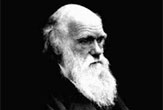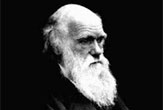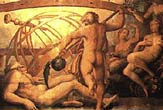Opening Arguments Made in 'Intelligent Design' Court Case

HARRISBURG, Pennsylvania (AP) -- A school district went to court Monday to defend its policy of telling students that a higher power may have created life -- an alternative to the evolution theory they are already learning.
Eight families are suing the Dover Area School District where the teen students are told about "intelligent design'' before their regular biology lessons on evolution. The families allege the policy violates the constitutional separation of church and state.
The intelligent design concept holds that Charles Darwin's theory of natural selection cannot fully explain the origin of life or the emergence of highly complex life forms. It implies that life on Earth was the product of an unidentified intelligent force.
Critics say intelligent design is merely creationism -- a literal reading of the Bible's story of creation -- camouflaged in scientific language, and it does not belong in a science curriculum.
About 75 spectators crowded the courtroom of U.S. District Judge John E. Jones III for the start of the non-jury trial. But the scene outside the courthouse was business as usual except for a lone woman reading the Bible.
Eric Rothschild, an attorney representing the students' families, said at the start of the trial Monday that school authorities "did everything ... to incorporate a religious point of view in science class and cared nothing about its scientific validity.''
But in his opening statement, the school district's attorney defended Dover's policy of requiring the students, who are about 14 years old, to hear a brief statement about intelligent design before biology classes on evolution.
Get the world’s most fascinating discoveries delivered straight to your inbox.
"This case is about free inquiry in education, not about a religious agenda,'' argued Patrick Gillen of the Thomas More Law Center, which lobbies for the religious freedom of Christians and is defending the school district.
"Dover's modest curriculum change embodies the essence of liberal education,'' Gillen said.
The first witness called by the plaintiffs, Brown University professor Kenneth Miller, said pieces of the theory of evolution are subject to debate, such as where gender comes from, but told the court: "There is no controversy within science over the core proposition of evolutionary theory.''
On the other hand, he said, "Intelligent design is not a testable theory in any sense and as such it is not accepted by the scientific community.''
Miller also challenged the accuracy of "Of Pandas and People'' and said it almost entirely omits any discussion of what causes extinction. If nearly all original species are extinct, he said, the intelligent design creator was not very intelligent.
The clash goes far beyond this rural district. President George W. Bush has weighed in, saying schools should present both concepts when teaching about the origins of life.
"The intelligent-design movement is an effort to introduce creationism into the schools under a different name,'' Rothschild has said.
Litigation on the matter has a long history: in the famous 1925 Scopes Monkey trial, Tennessee biology teacher John T. Scopes was fined $100 for violating a state law that forbade teaching evolution. The Tennessee Supreme Court then reversed his conviction -- on the narrow ground that only a jury trial could impose a fine exceeding $50. The law was repealed in 1967.
In 1968, the U.S. Supreme Court overturned an Arkansas state law banning the teaching of evolution. And in 1987, it ruled against balancing evolution lessons by teaching creationism.
Richard Thompson, president and chief counsel of the Thomas More Law Center, said Dover's policy merely requires teachers to read a statement that says intelligent design differs from Darwin's view and refers students to an intelligent-design textbook, "Of Pandas and People,'' for more information.
"All the Dover school board did was allow students to get a glimpse of a controversy that is really boiling over in the scientific community,'' Thompson said.
The Discovery Institute, a Seattle-based think tank that represents scholars who support intelligent design, opposes mandating it in public schools. Nevertheless, it considers the Dover lawsuit an attempt to squelch voluntary debates over evolution.
"It's Scopes in reverse. They're going to get a gag order to be placed on teachers across the country,'' said institute senior fellow John West.
Eugenie Scott, executive director of the National Center for Science Education, which supports the teaching of evolution, said the controversy has little to do with science.
Intelligent design supporters "seem to have shifted virtually entirely to political and rhetorical efforts to sway the general public,'' Scott said. "The bitter truth is that there is no argument going on in the scientific community about whether evolution took place.''
- SPECIAL REPORT: Evolution & Intelligent Design
- Court Case Threatens to 'Drag Science into the Supernatural'
- Nobel Prize Winners Speak Up to Support Evolution
- Poll: Public Divided on Evolution
SPECIAL REPORT
Evolution & Intelligent Design
PART 1
An Ambiguous Assault on Evolution
This Trojan Horse for Creationism has become very popular. But who is being duped? And what does it all mean for morality?
PART 2
Intelligent design is presented as a legitimate scientific theory and an alternative to Darwinism, but a close look at the arguments shows they don't pass scientific muster. So why are scientists worried?
PART 3
As evolution takes a beating, scientists remind us of the difference between fact, theory and belief.
PART 4: Coming Tuesday
Anti-evolution Attacks on the Rise
Attacks on evolution are on the rise once again in America. Learn about recent legislation in various states challenging evolution's place in the public school curriculum.
Evolving Issue
Discoveries that have helped build the puzzle of mankind's evolution.
Creation Myths
Legends that helped define civilizations past and present.
Vestigal Organs
Darwin argued that useless limbs and leftover organs are evidence of evolution.






